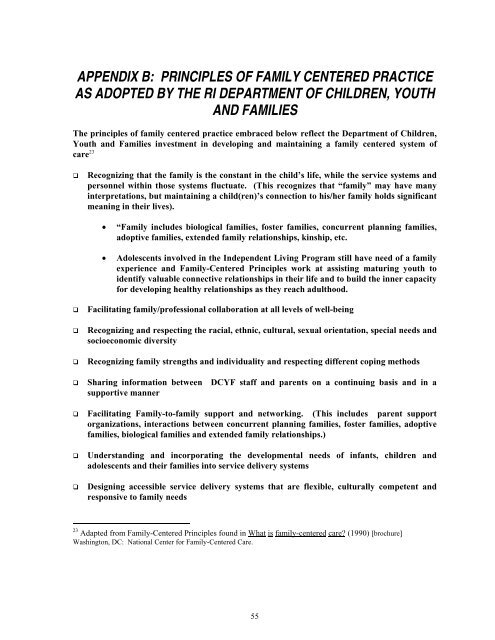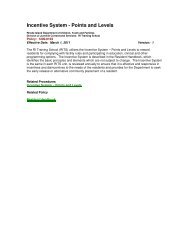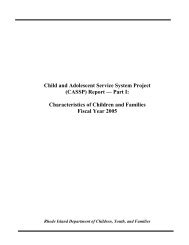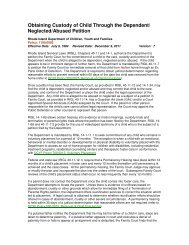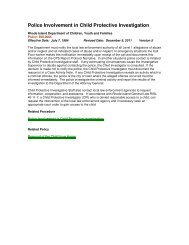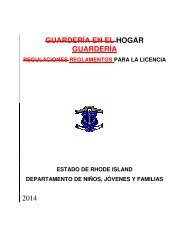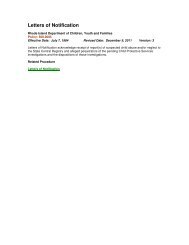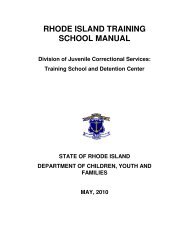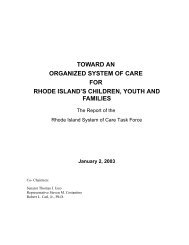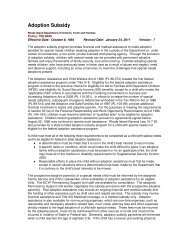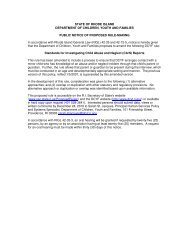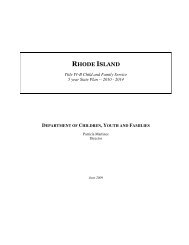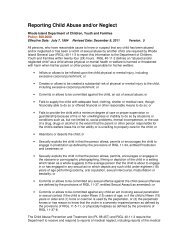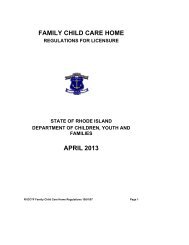system of care for rhode island's children, youth and families
system of care for rhode island's children, youth and families
system of care for rhode island's children, youth and families
Create successful ePaper yourself
Turn your PDF publications into a flip-book with our unique Google optimized e-Paper software.
APPENDIX B: PRINCIPLES OF FAMILY CENTERED PRACTICE<br />
AS ADOPTED BY THE RI DEPARTMENT OF CHILDREN, YOUTH<br />
AND FAMILIES<br />
The principles <strong>of</strong> family centered practice embraced below reflect the Department <strong>of</strong> Children,<br />
Youth <strong>and</strong> Families investment in developing <strong>and</strong> maintaining a family centered <strong>system</strong> <strong>of</strong><br />
<strong>care</strong> 23<br />
! Recognizing that the family is the constant in the child’s life, while the service <strong>system</strong>s <strong>and</strong><br />
personnel within those <strong>system</strong>s fluctuate. (This recognizes that “family” may have many<br />
interpretations, but maintaining a child(ren)’s connection to his/her family holds significant<br />
meaning in their lives).<br />
• “Family includes biological <strong>families</strong>, foster <strong>families</strong>, concurrent planning <strong>families</strong>,<br />
adoptive <strong>families</strong>, extended family relationships, kinship, etc.<br />
• Adolescents involved in the Independent Living Program still have need <strong>of</strong> a family<br />
experience <strong>and</strong> Family-Centered Principles work at assisting maturing <strong>youth</strong> to<br />
identify valuable connective relationships in their life <strong>and</strong> to build the inner capacity<br />
<strong>for</strong> developing healthy relationships as they reach adulthood.<br />
! Facilitating family/pr<strong>of</strong>essional collaboration at all levels <strong>of</strong> well-being<br />
! Recognizing <strong>and</strong> respecting the racial, ethnic, cultural, sexual orientation, special needs <strong>and</strong><br />
socioeconomic diversity<br />
! Recognizing family strengths <strong>and</strong> individuality <strong>and</strong> respecting different coping methods<br />
! Sharing in<strong>for</strong>mation between DCYF staff <strong>and</strong> parents on a continuing basis <strong>and</strong> in a<br />
supportive manner<br />
! Facilitating Family-to-family support <strong>and</strong> networking. (This includes parent support<br />
organizations, interactions between concurrent planning <strong>families</strong>, foster <strong>families</strong>, adoptive<br />
<strong>families</strong>, biological <strong>families</strong> <strong>and</strong> extended family relationships.)<br />
! Underst<strong>and</strong>ing <strong>and</strong> incorporating the developmental needs <strong>of</strong> infants, <strong>children</strong> <strong>and</strong><br />
adolescents <strong>and</strong> their <strong>families</strong> into service delivery <strong>system</strong>s<br />
! Designing accessible service delivery <strong>system</strong>s that are flexible, culturally competent <strong>and</strong><br />
responsive to family needs<br />
23 Adapted from Family-Centered Principles found in What is family-centered <strong>care</strong>? (1990) [brochure]<br />
Washington, DC: National Center <strong>for</strong> Family-Centered Care.<br />
55


